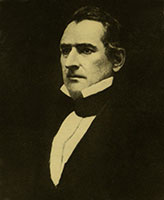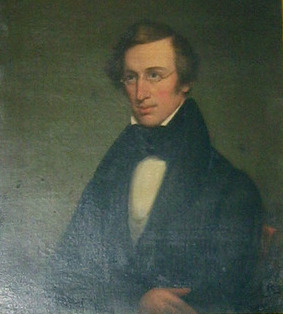
Henry Coit Kingsley (December 11, 1815, New Haven, Connecticut - December 19, 1886, New Haven, Connecticut) was an American lawyer who served as Director of the Cleveland and Pittsburgh Railroad Company and as Treasurer of Yale University

Henry Coit Kingsley (December 11, 1815, New Haven, Connecticut - December 19, 1886, New Haven, Connecticut) was an American lawyer who served as Director of the Cleveland and Pittsburgh Railroad Company and as Treasurer of Yale University
He was the second son of Professor James Luce Kingsley (Yale 1799) and Lydia (Coit) Kingsley. He graduated from Yale University in 1834. After graduation he was employed for a few months as a private tutor, and in the autumn of 1835 entered the Yale Law School. Here he studied for two years, with the exception of the winter of 1836-37, which he spent in a law office in Columbus, Ohio. In December, 1837, he was admitted to the practice of law in Ohio, and established himself in Cleveland, in partnership with his brother (Yale 1832). He married, September 6, 1841, Cornelia H., elder daughter of John Day, of Cleveland, who died August 31, 1843, leaving a daughter, who died in 1862. He married again, August 26, 1846, Jane Handy, of Utica, N. Y., daughter of Briggs W. Thomas, of that place. He continued actively engaged in the practice of his profession, uniting with it land agencies, until the summer of 1852, when in consequence of the impaired health of himself and his wife, they went to Europe. On returning, in 1853, he removed his residence to New Haven.
In 1854 he was elected a Director of the Cleveland and Pittsburgh Railroad Company, which was then seriously embarrassed, and in 1857 became insolvent. From 1857 to 1866 Kingsley had the principal charge of the financial affairs of the company, which in 1862 regained a sound position. In July, 1862, he was elected Treasurer of Yale College, and he remained in this office until his death, fulfilling also during the same time many responsible private trusts.
On the morning of the 19th of November, 1886, while driving to his business he received a severe injury. A cart was driven against his carriage, and as a result, he was thrown violently forward upon one of the wheels. Two ribs were broken, and other injuries were received. For some weeks he seemed to be recovering, when unfavorable symptoms developed, and after severe and protracted suffering he died on the morning of December 19, at the age of 71. His wife survived him, without children.

Daniel Coit Gilman was an American educator and academic. Gilman was instrumental in founding the Sheffield Scientific School at Yale College, and subsequently served as the second president of the University of California, Berkeley, as the first president of Johns Hopkins University, and as founding president of the Carnegie Institution. Eponymous halls at both Berkeley and Hopkins pay tribute to his service. He was also co-founder of the Russell Trust Association, which administers the business affairs of Yale's Skull and Bones society. Gilman served for twenty five years as president of Johns Hopkins; his inauguration in 1876 has been said to mark "the starting point of postgraduate education in the U.S."

Henry B. Payne was an American politician from Ohio. Moving to Ohio from his native New York in 1833, he quickly established himself in law and business while becoming a local leader in Democratic politics. After serving in the Ohio Senate, Payne was elected to a single term in the United States House of Representatives in 1874. In the House, he worked unsuccessfully for a compromise in the debate over whether all of the nation's currency should be backed by gold. He was defeated for reelection, but served on the Electoral Commission that convened in early 1877 to resolve the dispute over the results of the 1876 presidential election.

Joseph Trumbull was a U.S. lawyer, banker, and politician from Connecticut. He represented Connecticut in the U.S. Congress and served as the 35th Governor of Connecticut from 1849 to 1850.

Samuel Finley Vinton was a member of the United States House of Representatives from Ohio from March 4, 1823 to March 3, 1837 and again from March 4, 1843 to March 3, 1851.

Arthur Twining Hadley was an American economist who served as President of Yale University from 1899 to 1921.

William Alfred Buckingham was a Republican who served as the Governor of Connecticut during the Civil War and then as a United States Senator.

Orville Hitchcock Platt was a United States Senator from Connecticut. Platt was a prominent conservative Republican and by the 1890s he became one of the "big four" key Republicans who largely controlled the major decisions of the Senate, along with William B. Allison of Iowa, John Coit Spooner of Wisconsin and Nelson W. Aldrich of Rhode Island.

Charles Roberts Ingersoll was an American lawyer and the 47th Governor of Connecticut from 1873 to 1877.

George Hoadley was the fourth Mayor of New Haven, Connecticut from 1822 to 1826 and the eighth Mayor of Cleveland, Ohio in 1846.

Eli Whitney Blake, Sr. was an American inventor, best known for his mortise lock and stone-crushing machine, the latter of which earned him a place into the National Inventors Hall of Fame.
Danford Newton Barney was an American expressman who served as president of Wells Fargo & Company from 1853 to 1866.

John Addison Porter was an American journalist, and the first person to hold the position of "Secretary to the President". He was born in New Haven, Connecticut and died in Pomfret, Connecticut.
Charles Richard Alsop was an American politician.

Alexander Catlin Twining was an American scientist and inventor.
Timothy Taylor Merwin was an American lawyer, state legislator, and businessman.
Dexter Russell Wright was an American lawyer and politician.

Henry Noble Day was an American philosopher.
John Alfred Foot was an American politician.

Samuel Augustus Fuller Sr. was an American steel industry executive during the Gilded Age in the United States. A resident of Cleveland, Ohio, he founded the Union Iron Works and Condit-Fuller & Co., which later became the Bourne-Fuller Company. Cyrus S. Eaton combined this company with two others to form the Republic Steel Company which became the third largest steel company in the U.S., trailing only U.S. Steel and Bethlehem Steel in size.
Pelatiah Webster Perit was a prominent New York merchant and banker.
![]() This article incorporates public domain material from the 1887 Yale Obituary Record .
This article incorporates public domain material from the 1887 Yale Obituary Record .